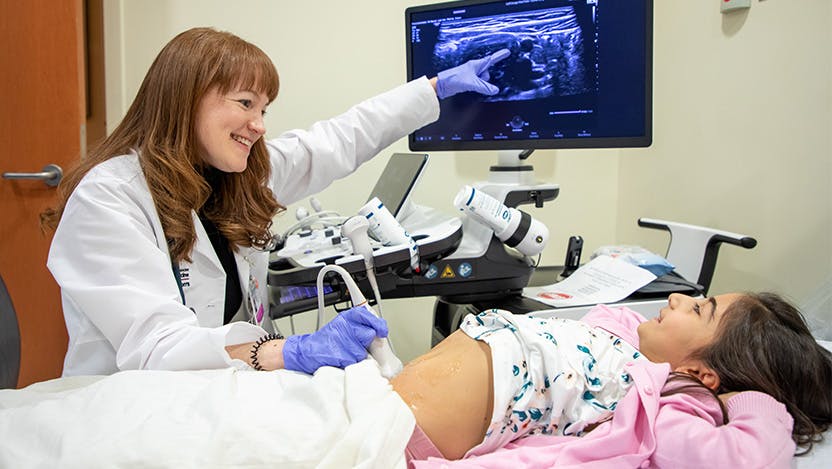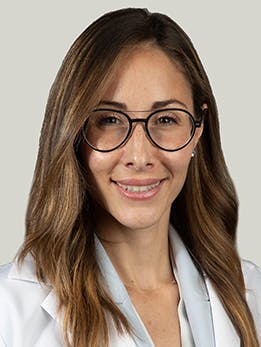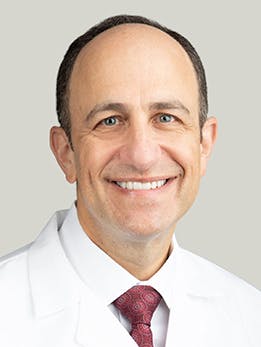Intestinal ultrasound is a game-changer for kids with inflammatory bowel disease

Amelia Kellar, MD, MSc, is one of a select few pediatric gastroenterologists in the country using intestinal ultrasound for noninvasive monitoring in children with Crohn’s disease or ulcerative colitis.
As Director of Pediatric Intestinal Ultrasound (IUS) at UChicago Medicine Comer Children’s, she is determined to train more specialists in her field in this novel imaging modality performed at hospital bedsides or outpatient clinics.
Learn more about pediatric intestinal ultrasound at Comer Children's
“We have an opportunity to revolutionize how we care for kids with inflammatory bowel disease using point-of-care bowel ultrasound,” she said.
Kellar is working to establish Comer Children’s as an international training center for pediatric gastroenterologists to learn to use this technology that yields real-time results.
Close monitoring of patients with inflammatory bowel disease (IBD) is critical to ensure that effective treatment is initiated before irreversible bowel damage occurs. In children, uncontrolled disease can affect growth and development.
Typically, children require invasive testing, often with serial colonoscopies, to monitor the impact of therapy on bowel healing. Yet the specificity and sensitivity of IUS has proven to be comparable to colonoscopy, according to Kellar.
“With intestinal ultrasound, I can see all the layers of the bowel wall, which allows me to assess the severity and extent of inflammation,” said Kellar. “With colonoscopy, we only see the mucosal surface lining the bowel.”
IUS also allows her to measure another parameter of inflammation: blood flow in layers of the bowel wall. This non-invasive imaging test can reveal complications of Crohn’s disease, such as fistula tracts, abscesses, and strictures.
Although CT and magnetic resonance enterography can also reveal the degree of bowel inflammation, they have significant drawbacks. Besides being expensive, CT scans expose kids to ionizing radiation. MRI imaging often requires children to consume a large volume of contrast and to remain still for long periods to obtain bowel images.
Whereas colonoscopy is invasive and requires sedation by a pediatric anesthesiologist, there is no fasting, bowel preparation, or discomfort with IUS. And the point-of-care testing enables Kellar, patients, and families to see in real-time whether therapy is effective.
“Instead of performing a colonoscopy or an imaging test and waiting for the results, I can use intestinal ultrasound at an office visit to show patients and their families how the bowel is responding to therapy. We can talk together about medication management and quickly intervene with additional treatment if necessary,” said Kellar. “Seeing real-time results with intestinal ultrasound helps the patient and family get involved in clinical decisions.”
The convenience and safety factors enable Kellar to rapidly assess -- and repeat -- the therapy more often than she could with repeat colonoscopies or traditional imaging.
“The ultrasound procedure also minimizes any negative association kids have with their medical care, so they are more willing to be monitored closely,” she said.
IUS is commonly performed by general gastroenterologists in Europe. “As part of their core curriculum, gastroenterologists in Europe are taught general abdominal ultrasound, so it is integrated into monitoring,” says Kellar. “However, gastroenterologists in the U.S. aren’t traditionally trained to perform ultrasound exams.”
The more pediatric centers we have offering this technology, the more children will benefit from it.
Kellar, who received her medical training in Canada, conducted research in IUS as a diagnostic and monitoring tool with Canadian gastroenterologists and IBD specialists who pioneered intestinal ultrasound in that country.
Kellar spent the last year completing an Advanced Fellowship in IBD at the Icahn School of Medicine at Mount Sinai in New York City, where she worked alongside physicians who organized the first IUS course in the U.S.
In 2022, UChicago Medicine established its Intestinal Ultrasound Program under the directorship of Noa Krugliak Cleveland, MD, Assistant Professor of Medicine.
The program is now the largest in the U.S., with seven gastroenterology specialists using the ultrasound for adult and pediatric patients. The procedure is available in both inpatient and outpatient clinics at Chicago’s Hyde Park and River East locations. More clinics will soon follow in Northbrook and Orland Park, Illinois, and in Crown Point, Indiana.
UChicago Medicine’s IUS program has been a national leader in the dissemination of the technology across North America.
In 2022, Krugliak Cleveland and David T. Rubin, MD, Chief of the Section of Gastroenterology, Hepatology, and Nutrition, received a $1.7 million training grant from the Helmsley Charitable Trust to instruct clinicians in IUS and to develop a North American Alliance. Collaborators included Mount Sinai and the University of Calgary.
The next year, UChicago Medicine held a three-day, hands-on course for 30 gastroenterologists from around the world. The next grant-funded training sessions are scheduled for 2024 in Los Angeles, and in 2025 at a U.S. location still to be determined.
The UChicago Medicine is one of two centers nationwide that offers one-on-one instruction training with an expert clinician. Kellar’s pediatric expertise will enhance the training for pediatric gastroenterologists seeking certification by the International Bowel Ultrasound Group.
“I'm passionate about contributing to the intestinal ultrasound training program at UChicago Medicine. The more pediatric centers we have offering this technology, the more children will benefit from it,” said Kellar.
Cleveland, Rubin and Kellar are committee members of the International Bowel Ultrasound Group, with Kellar also serving on the group’s pediatrics committee. She and fellow committee members recently published the first comprehensive guideline on IUS for pediatric gastroenterologists.
Kellar also devised and published an IUS scoring system that assesses disease severity and inflammation -- based on bowel wall thickness and hyperemia -- specifically in pediatric patients with inflammatory bowel disease.
Kellar is now using IUS at the bedsides of children hospitalized for severe IBD and is collecting real-world data on response to therapy.
“Some newer medications for IBD are very fast-acting and we can detect response in 24 to 48 hours with intestinal ultrasound,” said Kellar. “We can scan patients more frequently to assess if therapy is working, which is not possible with colonoscopy, CT, or MRI imaging.”
Specifically, Kellar and her colleagues in New York used IUS to determine target levels of the biologic ustekinumab in children with IBD that correlate with transmural healing of the bowel.
The FDA recently approved multiple new therapies for adults with Crohn’s disease and ulcerative colitis. However, many of these medications are used off-label in children. “It’s very exciting to quickly monitor response to these medications in children to demonstrate efficacy and advocate for more therapeutic options,” said Kellar.
In other research, Kellar is collecting data from IUS in kids to define pediatric-specific values for inflammation.
“Currently we are extrapolating these measurements from adults, but we need to know normalized values in children with IBD in order to monitor them more accurately,” she said.

Noa Krugliak Cleveland, MD
Dr. Krugliak Cleveland specializes in gastroenterology and serves as Director of the Intestinal Ultrasound Program at UChicago Medicine.
Learn more about Dr. Krugliak Cleveland
David T. Rubin, MD
Dr. Rubin specializes in the treatment of digestive diseases. His expertise includes inflammatory bowel diseases (Crohn’s disease and ulcerative colitis) and high-risk cancer syndromes.
See Dr. Rubin's physician bio